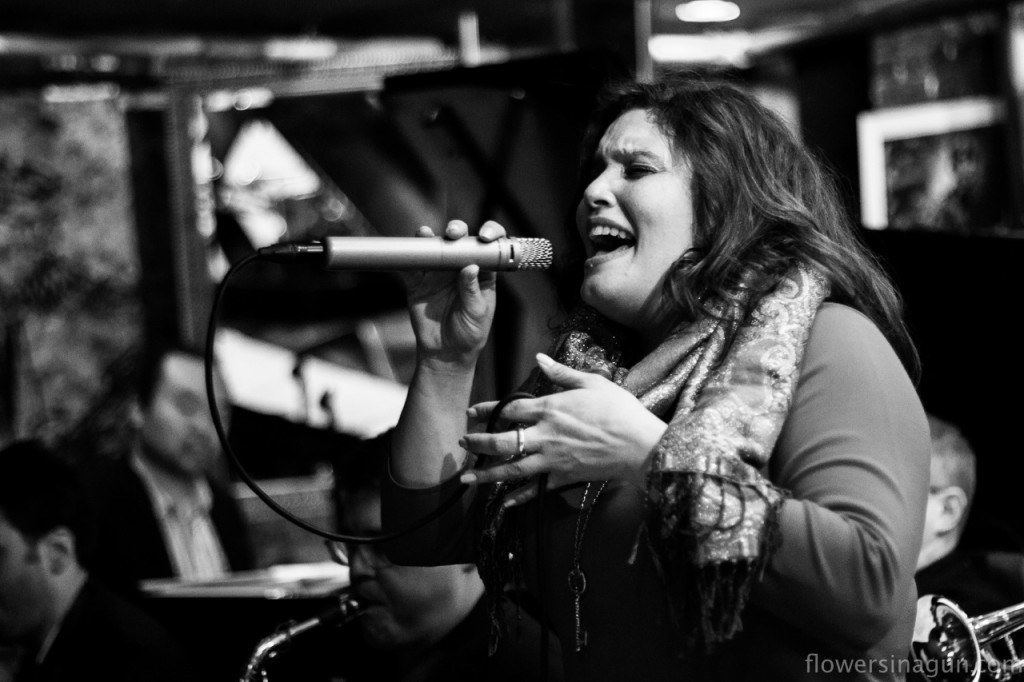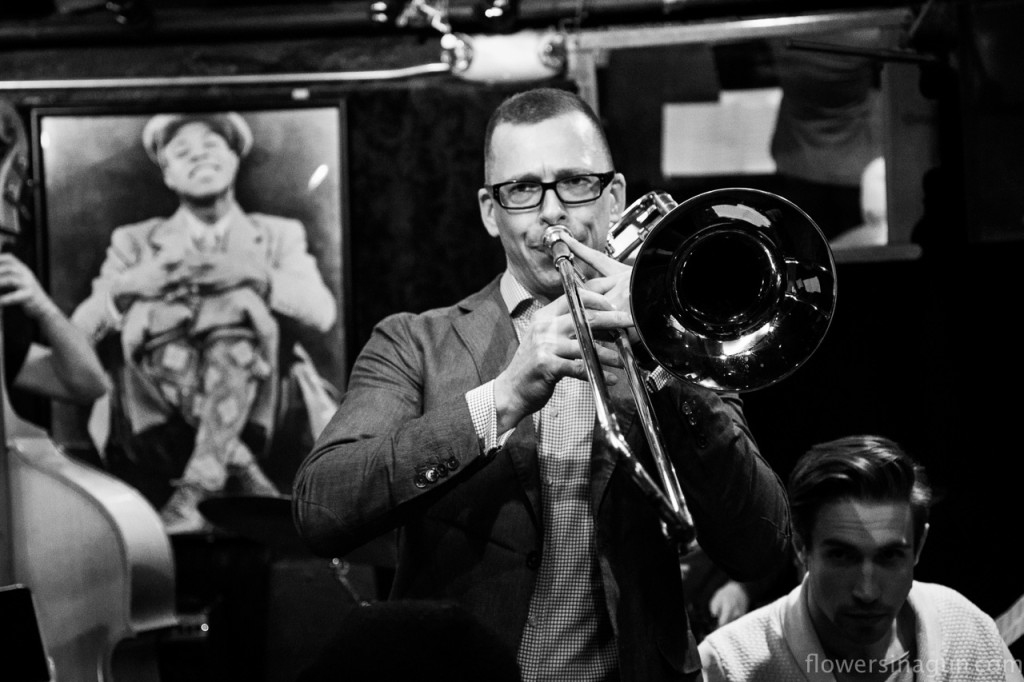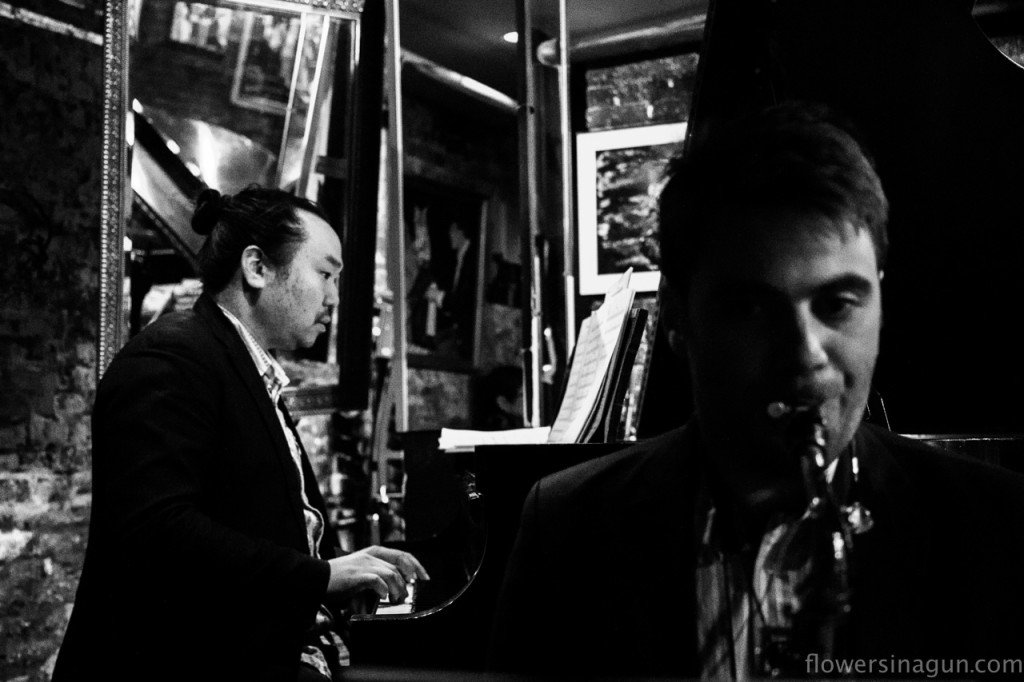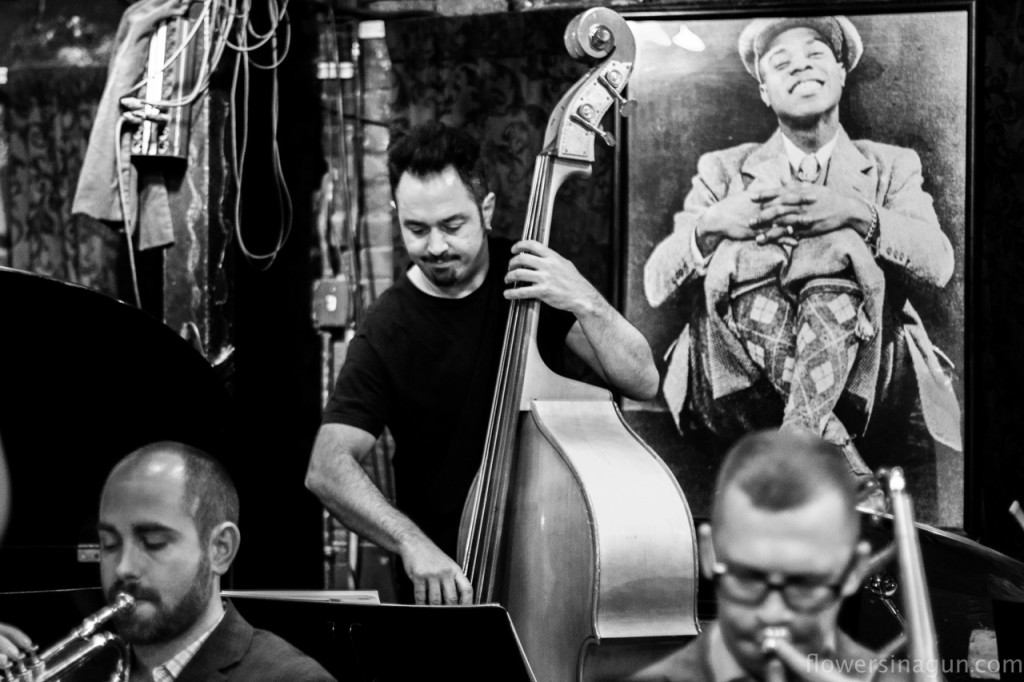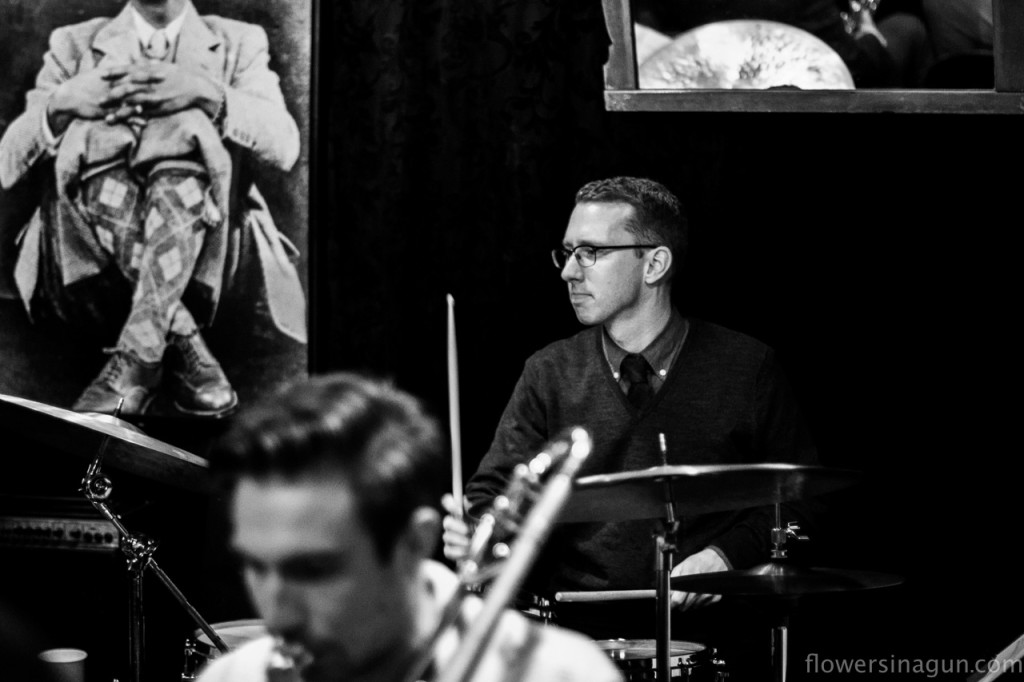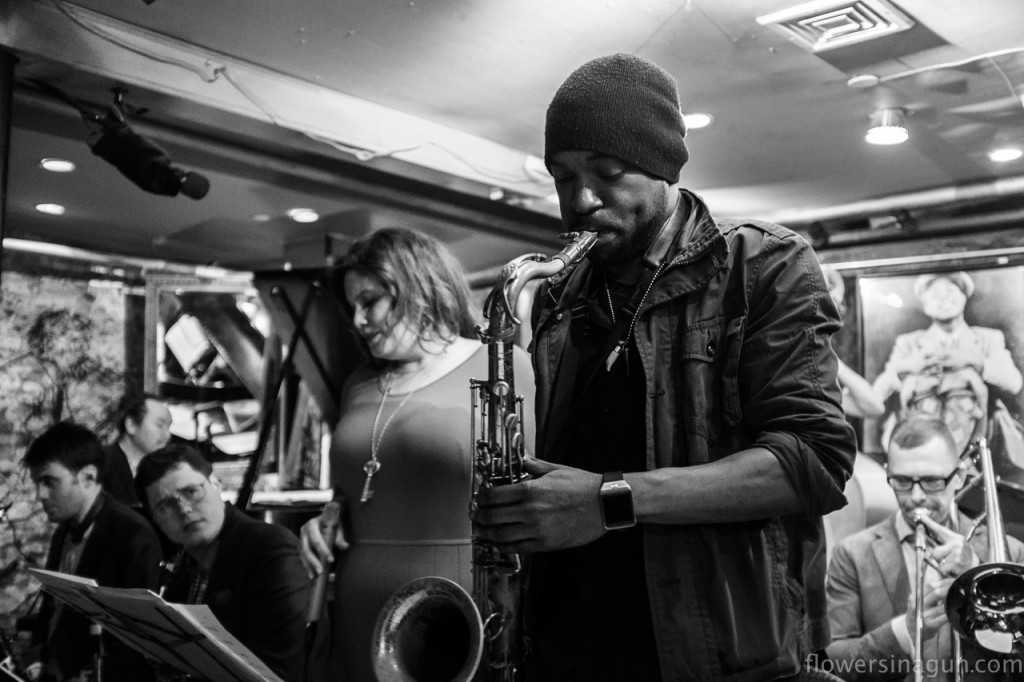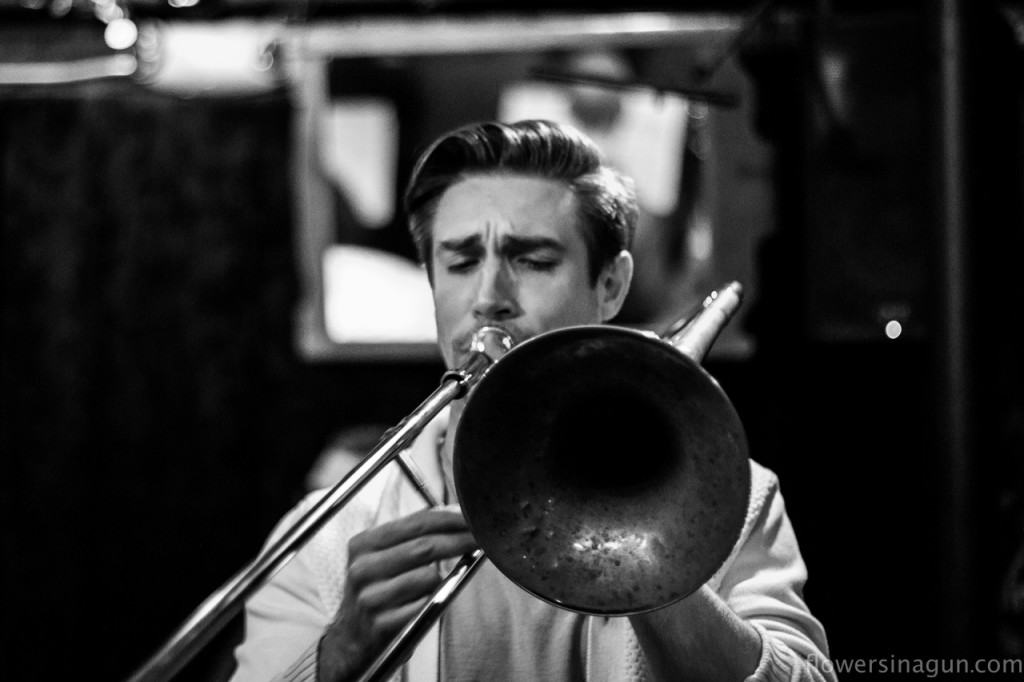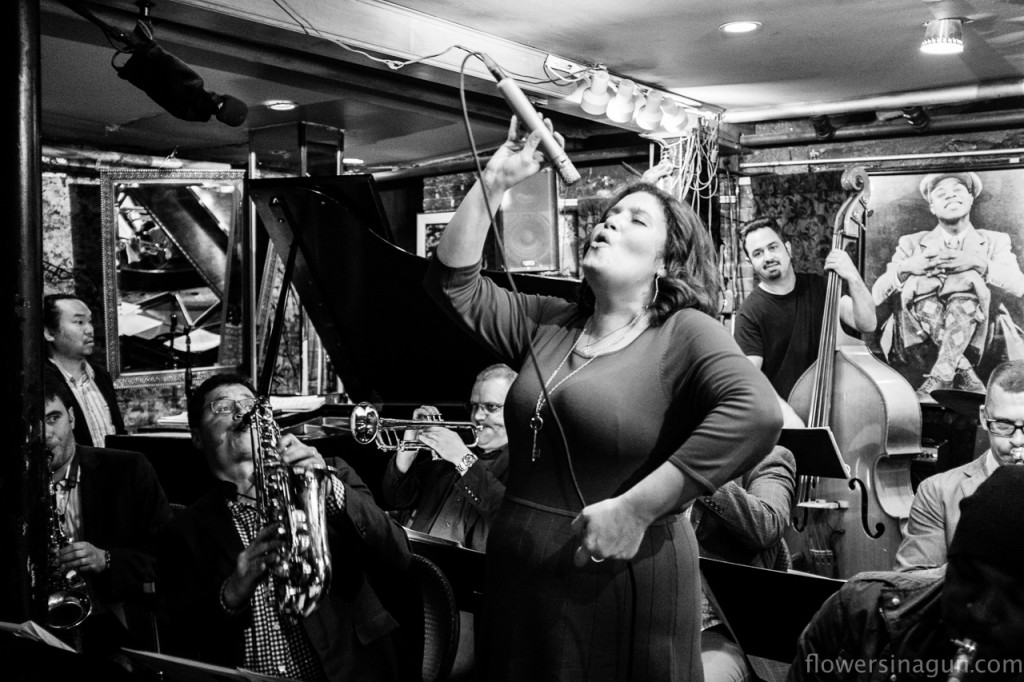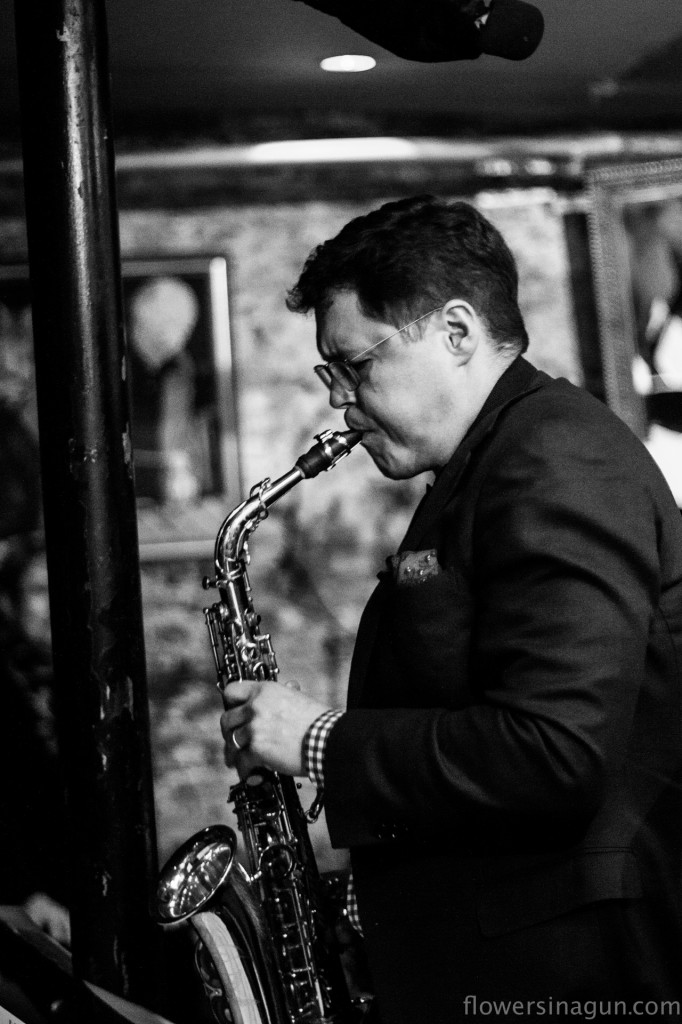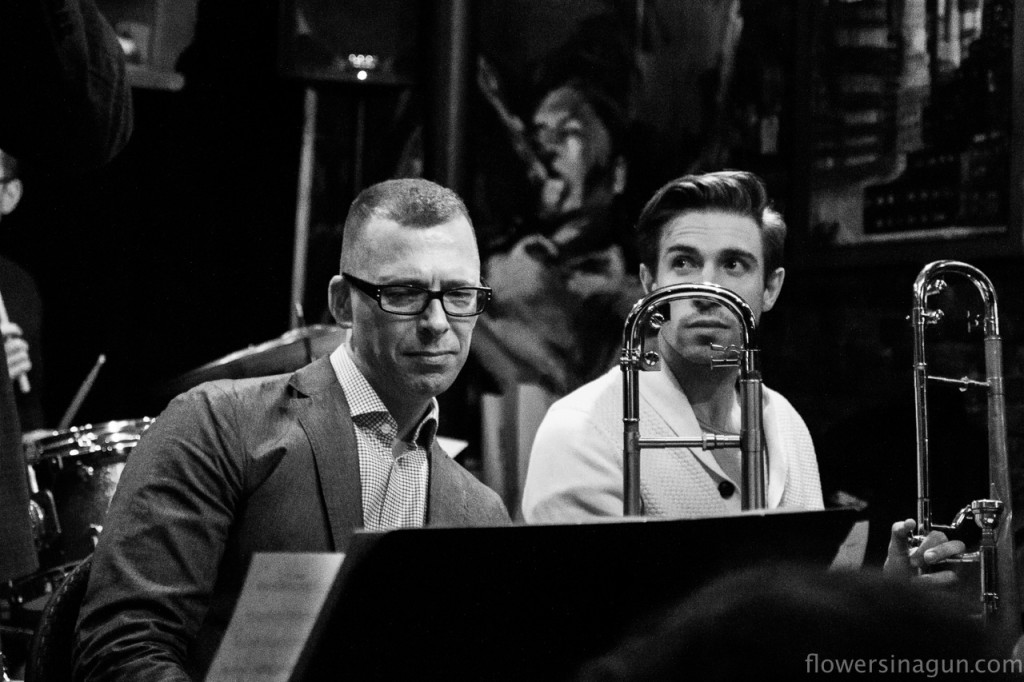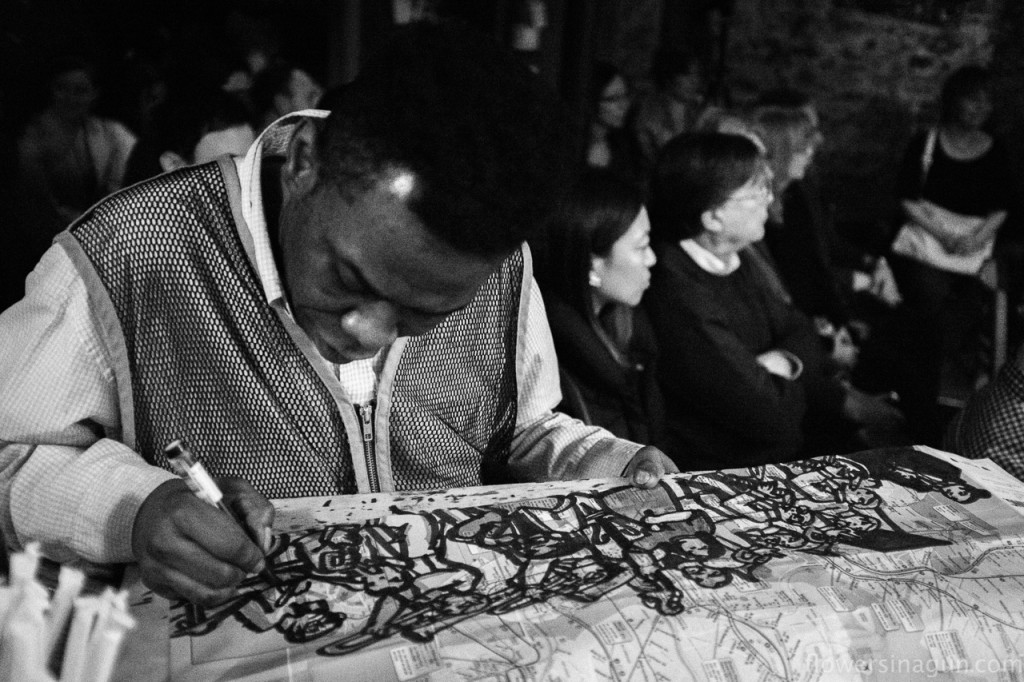March 8th is International Women’s Day and what a better way to celebrate it than listen to a wonderful singer, Marianne Solivan? Marianne has been on the jazz scene for a while, working her way tirelessly and with utter dedication to her craft. Her passion and powerful presence can’t leave the audience indifferent; she puts on a performance that moves and gets under your skin. No wonder there was a line in front of Smalls Jazz Club when Marianne Solivan brought her newest project to debut there on Sunday afternoon.
Marianne Solivan’s Big Band is fantastic. It really is. She managed to put together a group of top musicians including David Gibson who is also a musical director of George Gee Swing Orchestra and whose latest release on Posi-Tone “Boom!” was recently released to rave reviews. Todd Bashore, whose support and input proved invaluable, and a range of other musicians including John Chin, Stacy Dillard, Carl Maraghi, Peter Nelson, Chris Smith, Andy Gravish and Neal Caine whose magical touch made the show unforgettable.
The band played two sets without repeating any song and they kept the basement swinging with good energy. Marianne delivered a stunning performance, she was putting in 100% and more into the songs and her drive was nothing but contagious. Playing a mix of standards and her own material (some of which can be found on her newest record), she made each song her own and the band was on point every single time. If you haven’t had a chance to check these guys out, you are missing out on a wonderful new band.
We caught up with Marianne after the show to talk about her Big Band, the newest CD, touring, playing and being a woman on the jazz scene. Get to know this amazing lady and catch one of her shows in New York City while you can.
Flowers In A Gun: How did you make the transition from playing alto saxophone to becoming a singer?
Marianne Solivan: My days as an alto saxophonist were short lived. I picked up alto saxophone in the 3rd grade, after what they call “the instrument petting Zoo”. Typically you pick an instrument in the 3rd grade – they bring each class into the music room and let you look at the instruments, touch them, see how they work and after that you can pick yours. And I picked an alto saxophone, which was a total mistake – I thought I was picking a trumpet. I really wanted the one with three buttons! And when I got the saxophone I was like “What is this?!!” I played it through 6th grade. But when we moved from New Jersey to Massachusetts things changed. In NJ music was in every school, kids took private lessons too. None of that in MA, they didn’t even have a rental program through the school, you really had to study with a private teacher. And my parents couldn’t afford that. But I was singing the whole time. Of course I used to love playing saxophone, I had the first chair – I was very studious, I practiced all the time but due to financial reasons had to leave it behind.
FIG: You said before that Ella is one of your biggest influences. What is it about Ella that draws you in?
M.S.: There is so much about Ella! But one of the things for me is that she always sounds joyful. No matter what the song is about, she always sounds like there is hope. And it resonates with me, it always has from the first moment I heard her. And she is ridiculous, what comes out of her is pure music. It’s not thinking about theory or what technical things might or might not work. She has this intuitive expression that she is able to communicate even though she wasn’t a great communicator in English language. But she was able to communicate all sort of amazing things musically! When Billie sings a ballad it’s like death: there is no silver lining, everything sucks. There is just absolutely no way anything can get better. But when Ella sings it it’s like “all these terrible things happened to me but … I know I will love again” and I dig that.
FIG: Can you talk about your latest record Spark, how it all came together? What’s the story behind it?
MS: Spark … It’s one of the worst and best things that ever happened to me. But mainly the best thing! So it’s my second record on HiPNOTIC Records. We knew from the very beginning that we wanted to do not just standard material, but also original material. And this at the beginning had nothing to do with my personal writing. I mean sure I have a music degree, I have a jazz studies masters degree … But I am not a composer! I think that it’s a very different and special thing. But I can write music and I have written music. So with the record I had no intention of writing music, I wanted to commission a few great composers who are friends to write for me. And I kind of did, and except for one all of them ended up not being able to do it on time. They had other deadlines, etc. And at that point we were already in the process of booking studio time, etc. there was no time. So it became a different kind of thing. It became more about me, risking a lot for me, putting myself in a position that I was never in before – bringing my own tunes to the table, frankly because we just needed music. And so we tried one and then more and we went from there. I could have done it a different way but I was really supported by my band. And it took time to feel comfortable about it, to really feel the tunes but then once we were really getting into it everything just fell into place. A lot of interesting things happened to this record. I originally wanted someone else to produce it for me. It didn’t work out and in the end I produced it myself. I wanted to have somebody else do the arrangements for me. Ended up doing it myself … And every time I thought I couldn’t do it, I did. It was a huge learning curve for me. It’s like being pushed against the wall and having to use all of the knowledge you have and that you don’t even realize you have. … And when the recording date came it was simply amazing. My band was 110% with me and after the first day I thought, “Shit, this might be really good!”
FIG: Now, back to playing live. What’s the biggest difference between playing with your quartet as opposed to playing with the Big Band?
M.S.: I am still very new to the whole Big Band thing – it’s awesome, there is so much energy, but it’s different for me as a singer. I am used to doing it in a smaller group where I have a lot more openness to go in any direction I want at a moments notice. Thankfully I play with the guys who can just follow me and we can stretch and compress and stretch again. Big Band is a different experience and I am constantly learning about how much I can stretch in it and not mess it up. There are a lot of things to remember! But with the guys that I played tonight … there is so much energy, interest in the music, they are all great at it. Being surrounded by that much energy is pretty wild! It’s exhilarating. The response from the audience was amazing. But it’s still a new thing for me. I am giving it 6 months – and then I will know whether we are a thing or we are nothing … And I think we are going to be a thing. But it will just take time to see what kind of Big Band we want to be.
FIG: NYC is full of amazing musicians, how did you pick the people for your band?
M.S.: That was pretty easy. I thought of all the big bands I know and I love and the people that play in them that I knew and I asked to be in my band. And most of them said yes. Also a little over a year ago I had a tour in Russia and I needed Big Band charts, which at the time I didn’t have. So I started calling people and one of these people was David Gibson, who ended up writing two very beautiful charts for me very quickly. He also told me to talk to Todd because he writes for everybody. And he does. He ended up giving me a couple of tunes, no questions asked. It was amazing. When the time came to put together a band, I knew that I wanted to work with David Gibson. He is an amazing musician, arranger, great to have in the band, incredible human being and he has a lot of experience working with Big Band. So he was the first person I talked to. I obviously asked Todd and he was on board right away … Josh Evans, who wasn’t with us tonight, but he played with us the first gig. And I just love Josh – his sound is amazing! And what he wrote for one of my tunes, First Desire, – I was in tears the first time I heard it … And if one of my guys cant make it, I ask them who to call. They always give good advice, some guys tonight I never met before but they were absolutely incredible. It’s also about the vibe – I want someone who is professional, who is a good reader, who is gentleman if it’s a guy. Those things are really important too.
FIG: You just came back from a tour in Russia. What was the most memorable thing about it?
M.S.: The audience. The people just loved the music, they seemed to feel it very deeply and they expressed it. And we filled out big spaces – we played mainly Philharmonic Halls and Concert Halls. The smallest place was probably 300 people and the biggest one close to 700 – and they were all full! We played to a standing ovation every single time.
FIG: Do you think that it is a different to be a jazz musician for a woman? Does it matter?
M.S. It’s soooo hard! Of course it matters. But at this point I really enjoy being a woman and not a girl. I know things and I know that I know, it’s a very different feeling. But in this community it is very difficult. First you feel very excited about all of the attention you get as a woman, because these men are like dogs, sniffing up every tree. And I don’t care what anybody says but it feels good to have that much attention. But I think what I’ve realized over the years and from talking to older and younger woman on the scene, it’s the same story for everyone. It starts out great: you enjoy all the attention, all the energy, all the flirtation, feel very special and live that for a little while. And then you realize that there is a huge backlash to it. Our wonderful, talented, amazing jazz community of men often loves to talk trash about the women in it. It’s a sad thing and it’s historic, but still it’s a strange topic of conversation that resembles 8th grade locker room. And you have to get through that, push through and not completely withdraw from the community, which I have seen a lot of the women do or from becoming an angry human. But once you get through that, then it’s a whole other thing. Suddenly it’s all about the music. And it’s where I always wanted to be. But being a woman and playing jazz is definitely not for suckers. You have to have balls!
Anna Yatskevich is Flowers In A Gun’s glamorous jazz & beyond critic! Catch more reviews from her here and follow her on IG and Twitter @jazzaddikt.

